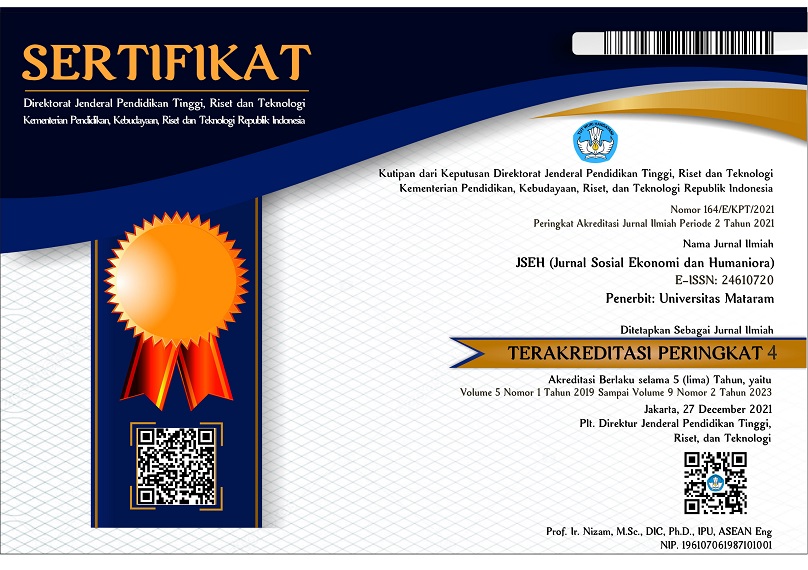Faktor-Faktor yang Mempengaruhi Niat Berwirausaha Studi Kasus pada Mahasiswa Fakultas Ekonomi dan Bisnis Universitas Mataram
Keywords:
Niat berwirausaha, sifat, keahlian, kontekstualAbstract
Di era pembangunan ekonomi Indonesia saat ini berwirausaha merupakan lapangan pekerjaan yang menarik untuk dipilih oleh mahasiswa setelah mereka lulus. Penelitian ini bertujuan untuk menganalisis faktor-faktor yang mempengaruhi niat berwirausaha pada Mahasiswa Fakultas Ekonomi dan Bisnis Universitas Mataram. Penelitian dengan menggunakan metode asosiatif. Model penelitian meliputi pengaruh dari faktor sifat kewirausahaan, keahlian kewirausahaan dan faktor kontekstual kewirausahaan terhadap niat berwirausaha. Penentuan besarnya sampling dengan rumus Slovin sebanyak 100 mahasiswa yang berasal dari mahasiswa Fakultas Ekonomi dan Bisnis Regular Pagi dan Sore. Responden dipilih dengan menggunakan teknik purposive sampling dengan kriteria sampling adalah mahasiswa yang telah mendapat mata kuliah kewirausahaan dan telah memiliki/menjalankan usaha. Alat analisis yang digunakan dengan menggunakan regresi berganda. Hasil penelitian menunjukkan bahwa faktor sifat kewirausahaan, keahlian kewirausahaan dan faktor kontekstual mempengaruhi niat berwirausaha mahasisawa Fakultas Ekonomi dan Bisnis Universitas Mataram.
References
Adhimursandi, D. (2016). Faktor-faktor Yang Mempengaruhi niat Kewirausahaan, 13(1), 193–210.
Ajzen, I. (2001), The Theory of Planned Behaviour. Organizational Behaviour and Human Decision Process, 50, 179-211
Azwar, B. (2012). Analisis Faktor-faktor yang Mempengaruhi Niat Kewirausahaan (Entrepreneurial Intention) (Studi terhadap Mahasiswa Universitas Islam Negeri SUSKA Riau ). Jurnal Kewirausahaan Menara, 12(1), 12–22.
Boumol, W.J., Litan., R. E. & Schramm, C.J. (2007). Sustaining entrepreneurial capitalism. Capitalism and Sociaety, 2(2) Article 1. Available at http://www.bepress.com/cas/vol2/iss2/art1
Drucker. (1998). Inovasi dan Kewiraswastaan. Erlangga. Jakarta
Gurbuz, G., & Aykol, S. (2008). Entrepreneurial Intentions of young educated public in Turkey. Journal of Global Strategic Management, 4(1), 47-56
Hassan, R.A. & Wafa, S.A. (n.d) Predictors towent repreneurial intention: A Malaysian Case Study Journal of Business and Management Sciences (11), 01-10
Hisrich, R.D. & Peters, M.P. (1995). Entrepreneurship: Starting, Devreloping, and managing A New Enterprises. Third Edition. New York:McGraw-Hill.
Hisrich, R.D, Peters, M.P ., & Shepherd, D.A (2008). Enterpreneurship: Mc Graw hill International edition.
Indarti, N. & Rostiani, R (2008). Intensi Kewirausahaan Mahasiswa: Studi Perbandingan antara Indoneisa, Jepang dan Norwegia. Jurnal Ekonomika dan Bisnis Indonesia, 23 (4), 1-26
Jonathan, Sarwono. (2006). Metode Penelitian Kuantitatif dan Kualitatif. Yogyakarta: Graha Ilmu
Kautonen, T., van Gelderen, M., & Fink, M. (2015). Robustness of the theory of planned behavior in predicting entrepreneurial intentions and actions. Entrepreneurship: Theory and Practice, 39(3), 655–674. https://doi.org/10.1111/etap.12056
Krueger, N. (1993). The impact of Prior Entrepreneurial Exposure on Perceptions of New Venture Feasibility and Desirability. Entreprenerial Theory Praactice, 18 (1):5-21
Lee, S.H. & Wong, P.K (2004). An Exploratory Study of Technopreneurial Intentions: A Career Anchor Perspective. Journal of Business Venturing, 19(1)-7-28
Lestari, R. B., & Trisnadi Wijaya. (2012). Pengaruh Pendidikan Kewirausahaan Terhadap Minat Berwirausaha Mahasiswa. Jurnal Ilmiah STIE MDP, 1(2), 112–119.
Licht, A.N. (2007). Entrepreneurial spirit and what the law can do about it. Comparative Labor Low & Policy Journal, vol 28 no.4
Geoffrey, G. Meredith, et. al. (1996). Kewirausahaan Teori Dan Praktek. Jakarta :PT. Pustaka Binaman Presindo.
Nasir, Moh. (2005). Metode Penelitian. Jakarta: Ghalia Indonesia
Ngoc Khuong, M., & Huu An, N. (2016). The Factors Affecting Entrepreneurial Intention of the Students of Vietnam National University — A Mediation Analysis of Perception toward Entrepreneurship. Journal of Economics, Business and Management, 4(2), 104–111. https://doi.org/10.7763/JOEBM.2016.V4.375
Oosterbeek, H., Praag, M.V. & Ijsselstein, A. (2008). The impact of entrepreneurship, education on entepreneurship, competencies and intentions: An evaluation of the junior achievement student mini-company program. Discussion Paper, No. 3641.
Rachbini. (2002). Ekonomi, Politik & Demokrasi Ekonomi (Political economics and economic Democracy). Jakarta: PT. Grasindo
Sugiyono. (2012). Metode Penelitian Kuantitatif Kualitatif dan R&D , Bandung: Alfabeta
Sarwoko, E. (2011). Kajian Empiris Entrepreneur Intention Mahasiswa. Jurnal Ekonomi Bisnis
Silvia. (2013). Pengaruh Entrepreneurial traits dan Entrepreneurial Skill terhadap Intensi Kewirausahaan (Studi Empiris Dampak Pendidikan Kewirausahaan pada Mahasiswa Universitas Kristen Petra, Surabaya). Journal Agora. Vol 1., No. 1
Turker, D. & Selcuk, S.S., 2008. Which factors effect entreprenurial intention of university degrees? Journal of Europeean Industrial Training, 33(2), 142-159
Zimmerer, W.T. (2002) Essentials of Entrepreneurship and Small Business management. 3rd Edition New York: Prentice-Hall
Published
How to Cite
Issue
Section
License

This work is licensed under a Creative Commons Attribution-NonCommercial 4.0 International License.







